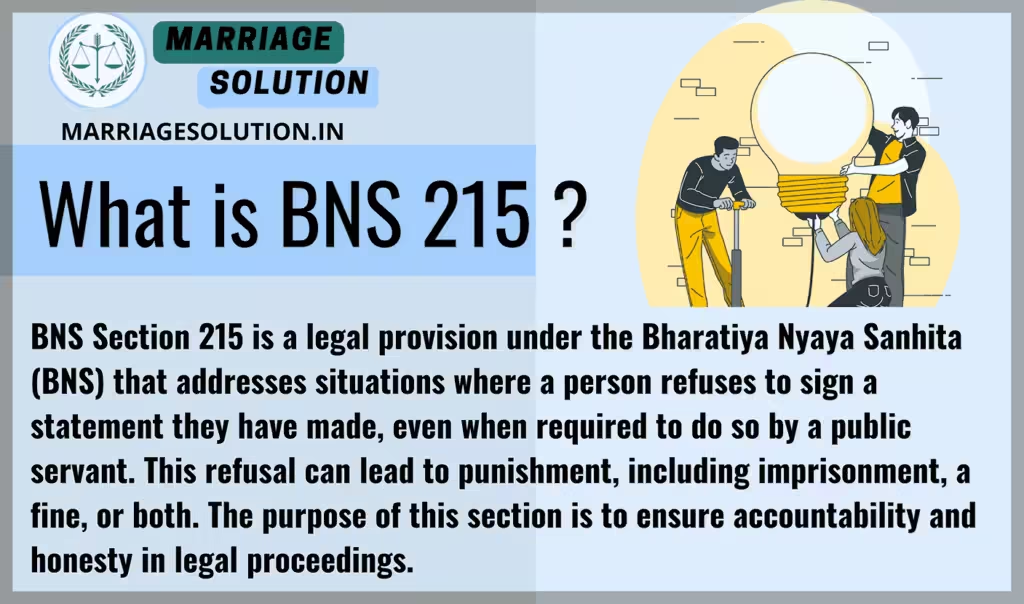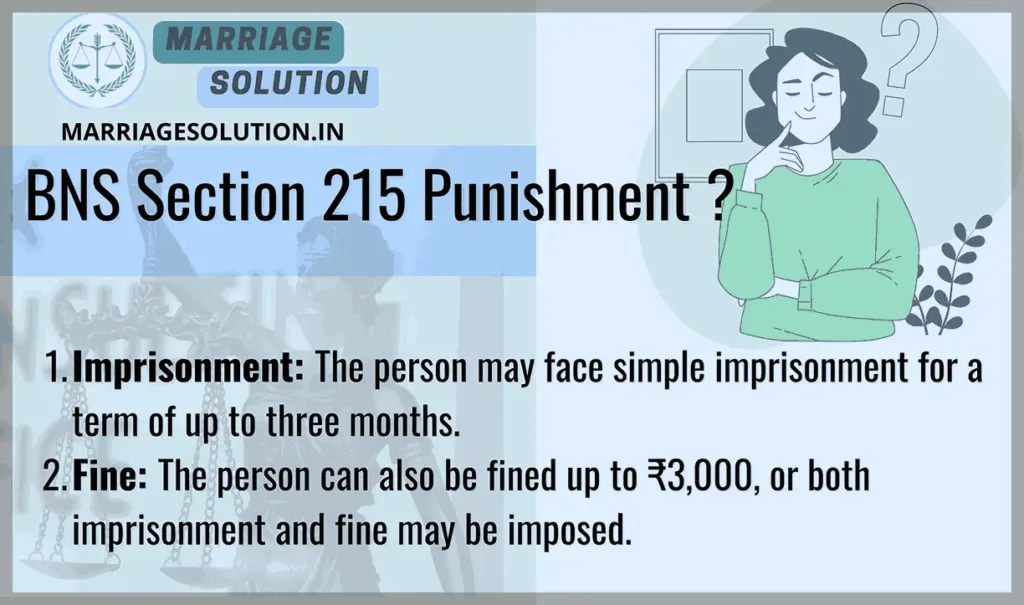Introduction of BNS Section 215
BNS Section 215 deals with situations where a person refuses to sign a statement that they have made when a public servant legally requires them to do so. The law mandates that individuals must sign their statements as a way of confirming the accuracy and authenticity of what they have said. Refusing to sign such a statement is treated as an offence, which can result in imprisonment, a fine, or both. This section ensures that individuals take responsibility for the statements they make in legal or official proceedings.
The Bharatiya Nyaya Sanhita (BNS) Section 215 replaces the old Indian Penal Code (IPC) Section 180.
What is BNS Section 215 ?
BNS Section 215 is a legal provision under the Bharatiya Nyaya Sanhita (BNS) that addresses situations where a person refuses to sign a statement they have made, even when required to do so by a public servant. This refusal can lead to punishment, including imprisonment, a fine, or both. The purpose of this section is to ensure accountability and honesty in legal proceedings.

Under Section 215 of the bns act 2023
“Whoever, being legally bound to sign any statement made by him, refuses to sign such statement when required to do so by a public servant legally authorized to require the signature, shall be punished with simple imprisonment for a term which may extend to three months, or with fine which may extend to three thousand rupees, or with both.”
1. Meaning of “Refusing to Sign Statement”
- When a person makes a statement before a public servant (such as police, magistrate, or other authority), the law requires them to sign it as confirmation of its truth and completeness.
- If the person refuses to sign, even though the officer is legally authorized to demand it, it becomes an offence under this section.
- The aim is to prevent people from later denying responsibility for their own statements.
2. Who is Covered?
This section applies to:
- Witnesses giving statements during investigations or court proceedings.
- Accused persons when asked to sign a recorded statement.
- Any person making a statement to a public servant who is authorized to require a signature.
3. Nature of the Offence
- Non-cognizable → Police cannot arrest without a warrant.
- Bailable → The accused has the right to apply for bail.
- Non-compoundable → The case cannot be settled privately; it must be decided in court.
- Triable by Magistrate → The matter will be heard by a Magistrate court.
4. Examples of BNS Section 215
- Example 1 – Witness Refuses: A witness in a theft case gives his statement to the police. When asked to sign it, he refuses. This refusal is punishable under Section 215.
- Example 2 – Accused Person Refuses: An accused gives a statement during investigation but declines to sign it later. This also amounts to an offence.
- Example 3 – Not an Offence: If a person cannot sign due to illiteracy or disability, and instead gives a thumb impression or alternative form of authentication, it does not amount to refusal.
5. Punishment under BNS Section 215
- Imprisonment → Up to 3 months (simple imprisonment).
- Fine → Up to ₹3,000.
- Both → In some cases, the court may impose both penalties.
6. Importance of BNS Section 215
- Ensures accountability → People cannot later deny their own words.
- Strengthens legal proceedings → Signed statements carry more weight in courts.
- Prevents obstruction → Stops individuals from blocking justice by refusing to sign.
- Updates IPC law → Increases fine (₹3,000 vs old ₹500 in IPC 180) to make punishment stricter.
Section 215 BNS Overview
BNS Section 215 refers to the refusal to sign a statement when legally required to do so by a public servant. This law applies when a person refuses to sign a statement they have made, after being asked by a public servant who has the legal authority to ask for the signature. Such refusal is treated as an offence and can lead to punishment, including imprisonment, a fine, or both.
10 Key Points of BNS Section 215
Ensuring Accountability: The purpose of this section is to promote accountability. If individuals were allowed to make statements without signing them, they could easily deny responsibility, causing confusion and obstruction in legal cases.
Legal Requirement to Sign: When a person makes a statement in front of a public servant, such as during an investigation or legal proceeding, they are legally bound to sign the statement. This ensures that the person acknowledges the accuracy of their statement and takes responsibility for it.
Refusal to Sign as an Offence: Refusing to sign a statement made to a public servant is considered an offence under BNS Section 215. This refusal can delay or hinder the legal process, which is why the law treats it seriously.
Punishment for Refusal: If someone refuses to sign their statement, they can be punished with simple imprisonment. The imprisonment can last for up to three months, which is a form of short-term imprisonment meant to discipline minor offenders.
Monetary Fine: In addition to imprisonment, the offender can also be fined. The fine can go up to ₹3,000. In some cases, both imprisonment and fine may be imposed.
Non-Cognizable Offence: This offence is classified as non-cognizable, meaning the police cannot arrest the person without a warrant. The case can only proceed after a complaint is made to the court.
Bailable Offence: Since it is a bailable offence, the person accused of this crime can obtain bail. This means they can avoid being detained in jail during the trial process.
Trial in a Magistrate Court: The trial for this offence is conducted in a Magistrate court. This type of court handles less serious offences and ensures that the case is dealt with promptly.
Impact on Legal Proceedings: Refusing to sign a statement can create obstacles in the judicial process, as signed statements are often required as proof or evidence in many legal cases. By signing, the person confirms that they are responsible for the information provided.
Protection of Legal Integrity: The law under BNS 215 ensures the integrity of the legal system by making sure individuals cannot evade responsibility for their statements. It is essential that once a person gives a statement, they cannot later deny it because they refused to sign it.
2 Examples of BNS Section 215:
- Example 1: Mr. A is questioned by a police officer in connection with a land dispute. After giving his statement, the officer asks him to sign it as a confirmation of accuracy. Mr. A refuses to sign, even though the officer is legally authorized to ask for the signature. As a result, Mr. A commits an offence under BNS Section 215 and can be punished.
- Example 2: Ms. B is a witness in a case of theft. She provides her statement to the police and is then requested to sign the statement by the investigating officer. Ms. B refuses to sign it, even though she has made the statement. This refusal makes her liable under BNS Section 215 and she may face imprisonment or a fine for this refusal.
BNS 215 Punishment
Imprisonment: The person may face simple imprisonment for a term of up to three months.
Fine: The person can also be fined up to ₹3,000, or both imprisonment and fine may be imposed.

BNS 215 bailable or not ?
Bailable: Yes, the offence is bailable, meaning the person accused can obtain bail and avoid detention during the trial.
Comparison Table – BNS Section 215 vs IPC Section 180
| Section | What it Means | Punishment | Bail | Cognizable? | Trial By |
|---|---|---|---|---|---|
| BNS Section 215 | Punishes anyone who refuses to sign a statement they have made when legally required to do so by a public servant authorized to require such signature. Ensures accountability and authenticity in legal proceedings. | Simple imprisonment up to 3 months, or fine up to ₹3,000, or both. | Bailable | Non-Cognizable | Magistrate Court |
| IPC Section 180 (Old) | Penalized refusal to sign a statement made before a public servant legally authorized to demand the signature, but with a much smaller fine and older procedural tone. | Simple imprisonment up to 3 months, or fine up to ₹500, or both. | Bailable | Non-Cognizable | Magistrate Court |
| Key Difference: BNS 215 increases the fine from ₹500 to ₹3,000 and retains the same imprisonment term to ensure stronger compliance and accountability. IPC 180 had outdated monetary limits and lesser deterrence. | |||||
BNS Section 215 FAQs
What does BNS Section 215 cover?
BNS Section 215 addresses the refusal to sign a statement made to a public servant when legally required to do so. Such refusal is considered an offence.
What is the punishment for refusing to sign a statement under BNS 215?
The punishment includes simple imprisonment for up to three months, a fine of up to ₹3,000, or both.
Is refusing to sign a statement under BNS 215 a cognizable offence?
No, it is a non-cognizable offence, meaning the police cannot arrest the person without a warrant.
Can a person get bail for this offence?
Yes, BNS 215 is a bailable offence, which means the person can obtain bail and avoid detention during the trial.
Where is the trial for this offence conducted?
The trial is conducted by the Magistrate court, typically where the offence was committed.
Conclusion
BNS Section 215 plays an important role in maintaining integrity in legal proceedings. By making it an offence to refuse signing a statement, the law ensures that individuals remain accountable for what they say before public servants. With stricter penalties compared to IPC 180, this section strengthens legal accountability and prevents people from escaping responsibility.
Need Legal Support?
If you are dealing with court cases, marriage problems, or any other legal issue, our team at Marriage Solution – Lawyer Help is here for you. Simply fill out our quick online enquiry form, and we’ll connect you with the right legal expert to support your needs.
Finished with BNS 215? Continue exploring the next provisions of the Bharatiya Nyaya Sanhita (BNS), 2023. Each section includes explanations, examples, and plain-language breakdowns for easy understanding.
- 216 BNS : False statement on oath or affirmation to public servant or person authorised to administer an oath or affirmation.
- https://marriagesolution.in/bns_section/216-bns/
- BNS 217 : Giving false information on purpose to a public servant so that they use their legal powers in a way that harms someone else.
- https://marriagesolution.in/bns_section/bns-217/
- BNS 218 : Resistance to the taking of property by the lawful authority of a public servant.
- https://marriagesolution.in/bns_section/bns-218/
- BNS 219 : Obstructing sale of property offered for sale by authority of public servant.
- https://marriagesolution.in/bns_section/bns-219/
- 220 BNS : Buying or bidding for a property in an illegal way when it is being sold under the order of a public servant.
- https://marriagesolution.in/bns_section/220-bns/
Full IPC Section List: https://marriagesolution.in/ipc-section-list
All Indian Law & Blogs: https://marriagesolution.in/indian-law/
Full BNSS Section List: https://marriagesolution.in/bnss_section-list
